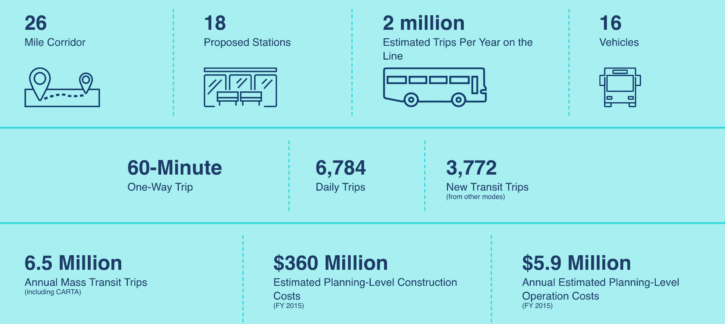U.S. Department of Transportation approves Lowcountry Rapid Transit for project development phase
October 8, 2019The Berkeley-Charleston-Dorchester Council of Governments received approval from the U.S. Department of Transportation recently to initiate project development for South Carolina’s first mass transit project.
A BCDCOG initiative, the Lowcountry Rapid Transit project development will receive key funding through the DOT’s Federal Transit Administration’s Capital Investment Grant program, which will provide much needed dollars for the estimated $387.5M total project cost.
“Receiving preauthorization to enter the project development phase is another huge step forward in making LCRT a reality in our region,” said Ron Mitchum, the BCDCOG’s executive director. “This step opens critical funding streams and puts us in position to continue generating forward momentum and progress on the project.”
LCRT 101
Lowcountry Rapid Transit is a proposed 26-mile bus rapid transit system connecting the communities of Charleston, North Charleston, and Summerville along the US 78/US 52 (Rivers Avenue) corridor. LCRT is projected to improve transit and enhance regional mobility in one of the most important and most congested corridors in the state.
The project includes upgrades to the existing maintenance and storage facilities, adding bus rapid transit stations and articulated electric vehicles.
“LCRT is a network of possibilities that will provide residents with dependable, frequent transportation and greater access to opportunities throughout the region,” said Sharon Hollis, the BCDCOG’s principal planner and LCRT project lead. “Connections between communities and employment centers would be enhanced and would also accommodate other modes such as biking and walking.”

Next Steps
Operating under the federal government’s Fixing America’s Surface Transportation Act of 2015, the BCDCOG will be required to select a locally preferred alternative, which it plans to have done by August 2020, and have the alternative adopted into the long-range transportation plan by January 2021.
As part of the National Environmental Policy Act framework, the required environmental review process began earlier this year. The NEPA process allows the project team to learn as much as possible about the local area and communities in order to reach a decision that best meets the needs of the community and minimizes or avoids impacts to the environment and communities.
At its completion, LCRT is expected to begin revenue service in late 2025.
“Being able to adjust to the rapid growth in our region is important when we consider mobility as a key factor in the expansion,” said Mitchum. “BCDCOG is very excited for this advancement in the LCRT process and is ready to improve not just transit for our residents and visitors in the Tricounty area, but their quality of life as well.”
ABOUT BCDCOG














